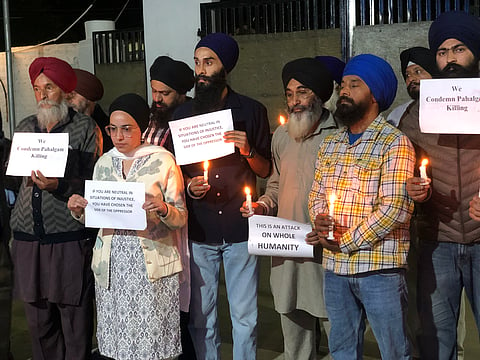

NEW DELHI: The Union government continues to face intense scrutiny over the glaring security lapses that led to the recent terrorist attack in Pahalgam, South Kashmir, despite efforts to shift the public narrative.
The brazen assault on tourists in one of Kashmir’s most popular and heavily visited locations has raised serious questions about the efficiency of central security agencies, most of which operate under the direct purview of the Union Home Ministry, led by Amit Shah.
Despite repeated claims by the government that peace and normalcy have returned to the Valley, the attack has exposed vulnerabilities in the region’s security apparatus. The Pahalgam incident has triggered criticism not just from opposition parties and civil society but also from strategic and security experts who term it a “massive failure of intelligence and vigilance.”
Thousands of tourists were reportedly present in Pahalgam at the time of the attack. Experts argue that it is shocking how such a high-density public area lacked adequate protective measures, despite being flagged in intelligence reports as a potential target.
Crowds of thousands in Pahalgam
“In any ordinary situation, a crowd of 15,000 to 20,000 would demand tight security arrangements. This failure is not minor—it’s a complete breakdown,” said a senior retired IPS officer.
In the wake of the incident, there is growing concern that the narrative around the return of peace in Kashmir is being used to promote tourism while ignoring the persistent threats.
“Tourism cannot be revived at the cost of civilian safety,” said a political analyst. “If terrorism isn’t completely eliminated, painting Kashmir as a safe tourist haven could be misleading and dangerous.”
Adding to the tension is the ongoing diplomatic face-off between India and Pakistan. Security experts suggest that the Pahalgam attack may not be an isolated act by Pakistan-based terror groups, but possibly part of a larger geopolitical strategy. They warn that in the event of escalated conflict, Pakistan could receive indirect backing from other powers in the region, including China.
China's guarded reaction on Pahalgam attack
Chinese reactions to the attack have been notably muted. While Ambassador Xu Feiong in New Delhi and the Chinese foreign ministry in Beijing expressed sympathy for the victims and their families, China conspicuously avoided labeling the incident a terrorist attack. This contrasts with the reactions of several other countries that outright condemned the attack as terrorism.
“China’s guarded stance is significant,” noted a top strategic expert. “It shows that Beijing is carefully navigating the situation, possibly with its own territorial interests in mind, particularly in Ladakh and Arunachal Pradesh.”
Ladakhi activist Sonam Wangchuk, speaking during a candlelight vigil for the victims, also raised alarms about the larger implications of the attack. “This is not just about Pahalgam. There is a bigger game at play. The entire border—from Ladakh to Arunachal—needs to be under constant surveillance. Both China and Pakistan have violated our trust multiple times, and we can’t afford another surprise like Galwan or Uri,” he said.
The government, so far, has avoided direct answers on how such a breach occurred in a supposedly secure zone. There have been no resignations or public accountability for the lapses. Experts and citizens alike are demanding transparency and immediate measures to prevent such tragedies in the future.
As the region stands at the intersection of tourism promotion, national security, and complex geopolitics, one message is becoming increasingly clear experts feel that cosmetic peace narratives are no substitute for robust ground-level security. There is a strong demand from national opposition parties that government must not only acknowledge its failures but also ensure that safety is not sacrificed for the common citizens, particularly tourists and Kashmiri students studying in various states in India.
Have you liked the news article?